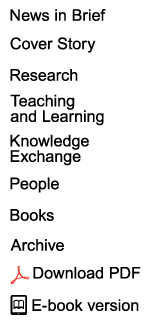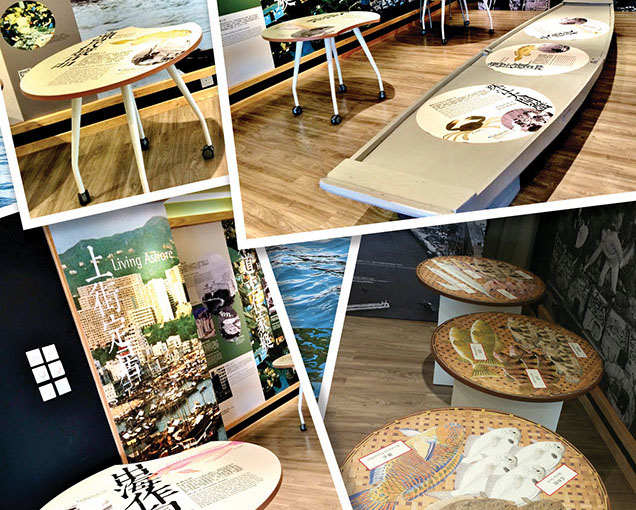
Riding The Sails Of Fishermen’s Tales
The changing culture of Aberdeen’s f ishing community is being recorded and preserved in a new project launched through HKU. Fishermen are also being trained to make a living from their heritage.

The Hong Kong story is often framed in terms of who rules, owns or occupies the land. Even the city’s critical role as a port is described as a landmark – the ‘gateway’ to Mainland China. Far less has been said about our water-dwelling and wandering fishing community. A new project is trying to correct that imbalance.
The ‘Fisheries and Fishing Community of Aberdeen’ project, which is organised by the Centre of Development and Resources for Students (CEDARS), has been collecting, preserving and sharing stories and information about fishing life through oral histories, a living museum and guided tours of Aberdeen Typhoon Shelter. It is also training fishermen to operate social enterprises based on their culture.
Dr Albert Ko of CEDARS has been overseeing the activities, which involve students, staff and alumni, as well as Aberdeen’s fisherfolk. The project is sponsored by the We Are With You (WAY) Project, a HK$10 million initiative funded by Chow Tai Fook Charity Foundation to support the University in building social capital in Southern District.
“Our belief is that if we want to develop the future, we need to know about the past. By bringing people together, enabling them to take pride in their community, understanding that community, we can move forward,” Dr Ko said.

Grocery boat in Aberdeen Typhoon Shelter, 1979.
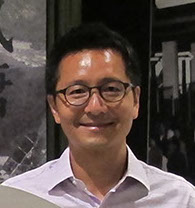
![]() If we want to develop the future, we need to know about the past. By bringing people together, enabling them to take pride in their community, understanding that community, we can move forward.
If we want to develop the future, we need to know about the past. By bringing people together, enabling them to take pride in their community, understanding that community, we can move forward. ![]()
Dr Albert Ko
In their own words
The heart of the project is a collection of oral histories that have been put together by
Dr Wong Wai-ling, a researcher in the Hong Kong Institute for the Humanities and Social Sciences, with the participation of trained student volunteers. They interviewed fishing people aged from their late 40s to late 80s and compiled 30 oral histories into a book, Memoryscape: Aberdeen Fishermen Oral Histories, which was published in August.
The stories reveal aspects of life at sea. For example, children were quite vulnerable. One interviewee told a tragic tale in which a young child who had not been tethered to a harness– common practice for the boat people – awoke from a nap while everyone was busy pulling in a haul. The child subsequently disappeared in the waters off Hainan Island, in an area reputed for such disappearances.
The interviewees also reflect on such things as their special foods, where they got the best harvests of fish, how they weathered storms, and their particular understanding of Hong Kong as a place divided down the middle, with fisher folk to the west having strong ties to the Gulf of Tonkin through Macau and those to the east looking to Taiwan through Shantou.
The oral history project is also the basis of a living museum – an exhibition called Stories of Aberdeen Fishing Folks, which opened in May, 2015 in the Postgraduate Hub of Graduate House. The exhibition features photos and artefacts of fishing life, and voice clips of fishing people talking about their lives. Dr Ko said they wanted to take it into the wider community and the Department of Architecture was helping to design a mobile version of the museum. Three schools have been invited to host it.
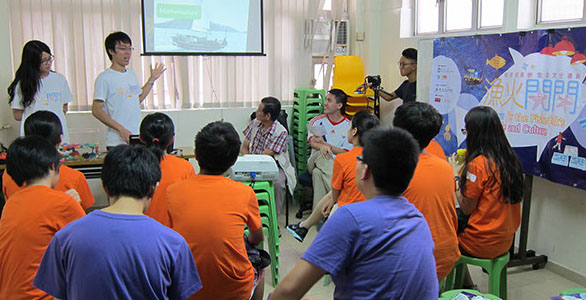
Workshop activities hosted by HKU students for the guided tours for the Fisherfolks’ Lifestyle and Culture in summer, 2014.
Helping the fisherfolk
In the meantime, the public can listen to the oral histories through a dedicated website and take guided boat tours around Aberdeen Typhoon Shelter in which the fisher folk talking about their lives. HKU students have helped to run the tours and provide interpretation, which has also been a great learning experience, according to student guide Tina Cheung Wing-yan, a third-year Bachelor of Arts student.
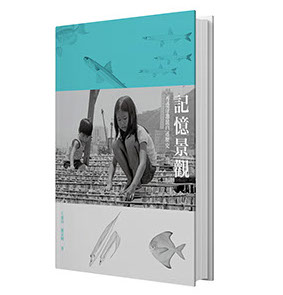
Dr Wong Wai-ling’s book, Memoryscape: Aberdeen Fishermen Oral Histories (in Chinese), is published by Joint Publishing Ltd. (王惠玲 、羅家輝著: 《記憶景觀:香港仔漁民口述歷史》,香港:三聯書店,2015年)
“Before I did this project I thought fishing was quite romantic – they sit in a boat and just throw the net into the sea to get fish. I now see there are many hardships. They have to travel far to get fish and face things like typhoons, where they can’t sleep for 24 hours. I appreciate this occupation more and I’m more grateful about having seafood to eat,” she said.
The next step is to sustain the project to the fisher folks’ benefit. Alumni have offered expertise and advice. One idea is to work with a restaurant to offer food made with recipes passed down through fishing families, in a venue that includes exhibits from the museum. Dr Ko said they were also looking at how to provide the fishermen with the necessary skills and know-how to manage these operations, without duplicating other re-training programmes. “In the end, all the work we are doing will help the fishermen to run these things themselves,” he said.
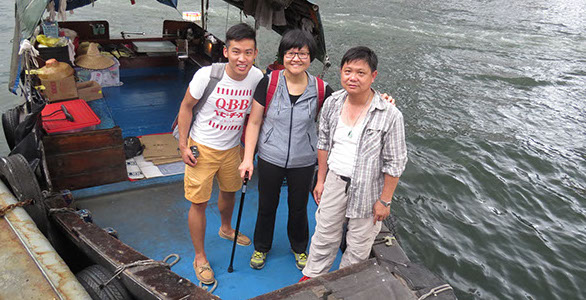
HKU student Mr Benedict Cheung (left) and Research Officer Dr Wong Wai-ling (centre) having oral history interview with fisherman Mr Chan Kwok-wah (right).
Excerpts of the fishermen’s oral histories can be heard at
http://wp.cedars.hku.hk/web/way/2015/05/13/stories-of-aberdeen-fishing-folks/
Next

